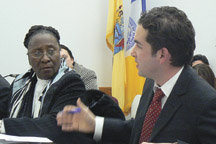Downtown City Councilman Steven Fulop is in a cost-cutting mood these days. Residents are facing a first quarter tax increase of around 25 percent.
Fulop proposed several ordinances on Monday at the City Council’s caucus meeting, initiatives he believes will save money while the city seeks ways to cut spending and balance its budget.
The deficit for the city’s 2009-2010 budget, which is $507 million, has been estimated at between $42 million and $72 million.
Fulop has suggested moving local elections from May to November, so that they coincide with state and national elections, a move that is allowed by recently approved state legislation. He says this would save $1.5 million in future years, although there are no municipal elections this year so it would not have an effect this year.
The next City Council meeting is on Feb. 24.
________
And as noted in the Jersey City Reporter last week, Fulop believes that outsourcing animal control operations to the Liberty Humane Society would save $800,000, although the town’s animal control officer disputes this.
The animal control initiative was withdrawn before Monday’s caucus, according to Fulop, for further discussion with city officials. The other initiatives were discussed with much debate and negotiation.
A last-minute cancellation of Wednesday’s council meeting due to the snowstorm means that some of the ordinances will be on the agenda for the next council meeting, scheduled for Wednesday, Feb. 24, at 6 p.m. in City Hall, 280 Grove St.
Assistant City Clerk Sean Gallagher said last week that Fulop’s three ordinances that would eliminate health benefits for the City Council, JCMUA, and JCIA boards will be on the agenda for Feb. 24. The two ordinances changing the election date will be reintroduced at the March 8 meeting to allow time for City Clerk Robert Byrne to give his input.
Also at the Feb. 24 meeting, there will be a public hearing on the proposed 2009-2010 budget, which is seven months late and covers spending through this coming June. And there will be a special meeting this coming Wednesday at 6 p.m. for other city business.
Not a healthy suggestion
Some council members at Monday’s caucus took issue with Fulop about cutting health benefits for the City Council and for other municipal boards.
Councilman Michael Sottolano, serving as interim council president due to the absence of Council President Peter Brennan, said Fulop should think about “fairness” when considering cuts to health benefits.
Sottolano cited the “low” pay of the council and unpaid positions on boards like the Jersey City Incinerator Authority and the Jersey City Municipal Utilities Authority. He said the health benefits help make up for the lack of compensation. City Council members work part-time and earn between $28,000 and $33,000, depending on longevity.
However, four of the council members – Willie Flood, Bill Gaughan, Peter Brennan and Viola Richardson – also happen to have full-time jobs with the county and they receive health benefits.
Gaughan said he receives health benefits from both the city and the county since each offers different types of coverage. Richardson, who works in the county corrections division, said she too receives both city and county benefits, and is considering in the future which one to waive.
Brennan, who works as confidential aide to County Executive Tom DeGise, refused to comment on whether he receives benefits from just his council job or the county, or both. Flood, the county registrar, could not be reached for comment before this story went to press.
Sottolano, at the meeting, suggested that if this legislation was passed, there should be a delay of several months before health benefits are phased out to allow board members to find alternatives.
Councilman David Donnelly said that when he left his job on the Mayor’s Task Force to join the council, he not only took a pay cut, but also found a second job that did not offer health benefits.
Fulop disagreed with the opposition, pointing out the city was not “in the business” of offering benefits to part-time employees. He considered JCMUA and JCIA board members also part-time employees since they meet once a month for about an hour. They do not receive pay.
Fulop, who works at a hedge-fund firm in New York City where he receives health benefits, said he is amenable to changes in his legislation that would allow for a delay.
Corporation Counsel Bill Matsikoudis told Fulop the Law Department is looking into whether or not the benefits can be legally ended.
Electing to be careful
When the conversation at Monday’s caucus focused on Fulop’s proposal to move municipal elections from May to November, there was even more animated discussion.
Fulop noted fewer elections means less money spent on ballots and other election costs. He also proposed the change because he said election turnout numbers are higher in November. In the May 2009 municipal election, which included the mayor and council seats, the total voter turnout was estimated at around 25 percent of registered voters.
Matsikoudis and some council members told Fulop that moving the election date would cause problems for future elections. They said a November election, if it required a runoff, would lead to another election in December during the holiday season, and a low turnout.
Matsikoudis proposed that City Clerk Robert Byrne, who was not present for the caucus, should weigh in on Fulop’s ordinance before a decision is made to introduce it or withdraw it from the agenda.
In addition to the opposition expressed in the caucus, Mayor Jerramiah Healy is adamantly opposed to Fulop’s proposal to change the election date.
Healy said in an interview last week that the date change would lead to an extra expense and also would get “lost in the fog” of the other elections taking place in November on the state and federal level.
Ricardo Kaulessar can be reached at rkaulessar@hudsonreporter.com.
